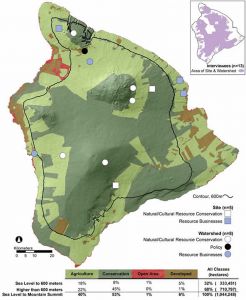MCC PROGRAM MANAGER NEEDS ASSESSMENT
The Participants
In Step 1 of Our Process, we heard wide-ranging management perspectives throughout our interviews that included 29 individuals who discussed: native ecosystems (terrestrial and marine), traditional cultural sites, traditional cultural homelands, marine recreation, open ocean harvesting and transport, near-shore safety, ranching, agriculture, county planning, community-based management, fire hazards, and invasive species.
Our interviewees manage a geographic range across Hawaiʻi Island in roughly equal percentages of coastal and mountain systems. The native-rich high-elevation systems are largely zoned for conservation land use, while the lower elevations are dominated by non-native species and have mainly human-centered land use (Fig. 1).
Manager-Driven Interview Method
Our manager-based interview approach, including open-ended questions and discussion as well as traveling to managers’ areas of work, was universally well received by managers and highly productive. The interview lengths ranged from 45 minutes to 2.5 hours, with most managers providing more than an hour of their time for the exploratory interview process. Many managers verbalized surprise that the interviews’ purpose was to create opportunities to better understand their worldview by listening to their day-to-day experiences, perspectives, and priorities. Some managers mentioned they rarely have the opportunity to share their perspectives with institutional researchers.
Interview Themes
MOST COMMON THEMES
In completing our thematic analysis of interviews, we identified 46 independent themes. Five of these themes were mentioned by more than 50% of the interviewees:
- Utilizing professional colleagues as a key source of information
- Employing personal and institutional observation and practice as sources of knowledge
- Investing in sustainable communities (both natural and human) as a goal
- Restoration and conservation of native ecosystems and traditional Hawaiian cultural sites and practices as a goal
- Increasing capacity for networking with other professionals on the island as a need
ADDITIONAL THEMES
We summarized theme responses to interview questions into the following categories:
- Knowledge Sources
- Goals
- Challenges
- Needs
- Climate Concerns
THEME EXAMPLES
The following are examples of themes that fit into the aforementioned categories and have been mentioned by managers and policy professionals:
- Far more often than consulting peer reviewed literature directly most managers rely on professional colleagues as their most common source of knowledge, including conferring with scientists in their professional communities or consulting other local experts.
- A significant goal for many managers is to involve communities directly in the lands and waters they manage by supporting recreation, restoration efforts, and food acquisition (farming, ranching, fishing, hunting) to increase personal experience, investment, and, ultimately, value in protecting natural resources.
- A universal challenge managers encounter is the impacts of environmental hazards such as invasive species, fire, and extreme weather events.
- Managers mentioned a need to obtain knowledge from scientists that is usable in both subject scope and spatial/temporal scale, and particularly in relation to climate change impacts.
- Extreme weather events were the most concerning topic related to climate change impacts.
- A diversity of managers made it clear that they would greatly benefit from improved information regarding localized shifts in storm frequency and intensity, sea level rise impacts, and future temperature and rainfall regimes, so they could assemble plans for small boat harbor use, cultural or historical sites, fire safety, native and invasive species management, possible flood water or waste water inundation, farmlands, ranchlands, water quality in near-shore reefs and loko iʻa (traditional fishpond systems), coastal erosion, or coastal water safety.
DIVE DEEPER
For more themes and additional information on our methods:
MORE MCC
QUICK LINKS
CONTACT
Scott Laursen
Climate Adaptation Extension Specialist
slaursen@hawaii.edu


